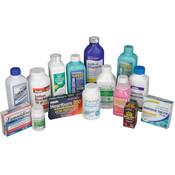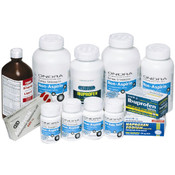An FDA analysis found that the undeclared active pharmaceutical ingredients in some of these products, often marketed as ‘dietary’or ‘food supplements,’ include sibutramine (a controlled substance, manufactured and legally distributed by Abbott Laboratories as Meridia in the U.S. and Canada, and Reductil in Europe and most other countries), rimonabant (a drug not approved for marketing in the United States), phenytoin (an anti-seizure medication), and phenolphthalein (a solution used in chemical experiments and a suspected cancer causing agent). Some of the amounts of active pharmaceutical ingredients far exceeded the FDA-recommended levels.
Prescription drugs vs. supplements
The Dietary Supplement Health and Education Act, commonly known as DSHEA, does not qualify dietary or food supplements as ‘drugs’ As a result, many of these products fall outside the realm of the FDA regulations for (prescription) drugs. While pharmaceutical companies must meet rigorous conditions for manufacturing, packaging, labeling, advertising and distribution of prescription drugs, dietary and food supplements do not require any proof. However, supplement labels are supposed to exactly state what’s in the product. Unfortunately, as this FDA analysis shows, this is not always the case.
While prescription drugs are monitored by the FDA, the agency does not monitor ‘dietary’or ‘food supplements’ as they do prescription drugs. In this case however, the FDA warned against the use of supplements contaminated with a variety of unlisted pharmaceuticals. Some of these active pharmaceutical ingredients may be approved for marketing as prescription drugs in the United States or Europe. However, the fact that these products are not listed as ingredients on the supplement product labels, as required by law, or exceeds recommended dosage levels, is a violation of existing regulations and a major concern to medical authorities. Dr Robert Mayr, an internationally recognized expert on dietary supplements, noted that: ‘There is a real danger that these ‘weight loss pills’ are putting consumers' health at risk.’
These weight loss products are often promoted and sold on web sites and in some retail stores. Some of the products claim to be ‘natural’ or to contain only ‘herbal’ ingredients, but actually contain potentially harmful ingredients not listed on the product labels or in promotional advertisements. Therefor, these products have not been approved by the FDA, are illegal and may be potentially harmful to unsuspecting consumers.
The FDA advises consumers who have used any of these products to stop taking them and consult their health care professional immediately. The FDA encourages consumers to seek guidance from a health care professional before purchasing weight loss products.
‘These tainted weight loss products pose a great risk to public health because they contain undeclared ingredients and, in some cases, contain prescription drugs in amounts that greatly exceed their maximum recommended dosages,’ said Dr Janet Woodcock, MD., director, Center for Drug Evaluation and Research, FDA. ‘Consumers have no way of knowing that these products contain powerful drugs that could cause serious health consequences. Therefore FDA is taking this action to protect the health of the American public.’
The FDA has inspected a number of companies associated with the sale of these illegal products, and is currently seeking product recalls. Based on the FDA's inspections and the companies' inadequate responses to recall requests, the FDA may take additional enforcement steps, such as issuing warning letters or initiating seizures, injunctions, or criminal charges.
The health risks posed by these products can be serious; for example, sibutramine, which was found in many of the products, can cause high blood pressure, seizures, tachycardia, palpitations, heart attack or stroke. This drug can also interact with other medications that patients may be taking and increase their risk of adverse drug events. The safety of sibutramine has also not been established in pregnant and lactating women, or in children younger than 16 years of age.
Rimonabant, another ingredient found in these products, was evaluated, but not approved by the FDA for marketing in the United States. The drug, which is approved in Europe, has been associated with increased risk of depression and suicidal thoughts and has been linked to five deaths and 720 adverse reactions in Europe over the last two years.
In October 2008 the European Medicines Agency (EMEA) completed a review of rimonabant following concerns over the medicine’s psychiatric safety. The Agency’s Committee for Medicinal Products for Human Use (CHMP) concluded that the benefits of rimonabant no longer outweigh its risks, and that its marketing authorisation should be suspended across the European Union (EU). Following these conclusions, Sanofi-Aventis, in November 2008, decided to discontinue the ongoing rimonabant clinical development program in all indications.
When in doubt...
Consumers in doubt about any ‘weight loss’ or dietary supplement they are currently using, should make sure to contact the manufacturer or distributor listed on the label. In all cases, health care professionals and consumers should report serious adverse events or side effects and product quality problems to the FDA's MedWatch Adverse Event Reporting program either online, by regular mail, fax or phone.
The tainted weight loss products include the following products and brands:
- Fatloss Slimming
- 2 Day Diet
- 3x Slimming Power
- Japan Lingzhi 24 Hours Diet
- 5x Imelda Perfect Slimming
- 3 Day Diet
- 7 Day Herbal Slim
- 8 Factor Diet
- 7 Diet Day/Night Formula
- 999 Fitness Essence
- Extrim Plus
- GMP
- Imelda Perfect Slim
- Lida DaiDaihua
- Miaozi Slim Capsules
- Perfect Slim
- Perfect Slim 5x
- Phyto Shape
- ProSlim Plus
- Royal Slimming Formula
- Slim 3 in 1
- Slim Express 360
- Slimtech
- Somotrim
- Superslim
- TripleSlim
- Zhen de Shou
- Venom Hyperdrive 3.0







No comments:
Post a Comment